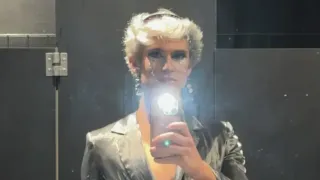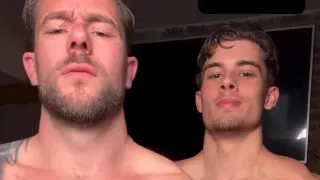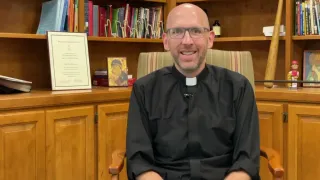January 1, 2018
Reviving the Message :: The Morality of Equality
Jeff Taylor READ TIME: 6 MIN.
Rev. William Barber II announced this year that he would be stepping down as head of the North Carolina chapter of the NAACP, after leading it for over a decade. He has been credited with breathing new life into the group, and taking it, as was his stated goal at the start of his tenure, "from banquets to battle."
While the news would be deflating in most contexts, the cause for the change is in fact cause for uplift.
Barber, who was elected president of the NAACP's youth council at age 15, and was student government president of both his high school class and during his college years at North Carolina Central University, is anything but done.
"I'm not leaving the state," he told Raleigh's News & Observer back in May. "I'm accepting a call, a very spiritual call."
That call?
To make a nationwide impact, organizing with other leaders to jumpstart a moral revival in America, by relaunching Dr. Martin Luther King Jr.'s Poor People's Campaign, some 50 years after it was initially conceived.
Relaunching the Poor People's Campaign
Barber is now heading up Repairers of the Breach, a social justice group established to train faith leaders who wish to also answer a call to carry on the ceaseless fight for justice and economic and civil rights.
It is this group, for which he was consecrated as Bishop with the College of Affirming Bishops and Faith Leaders by the LGBTQ-led College of Progress Bishops earlier this year, along with the Kairos Center at Union Theological Seminary in New York City, that will lead the new Poor People's Campaign: A National Call for Moral Revival.
The original campaign was cut short, due primarily to King having been assassinated less than a year after he made a public speech announcing the need for such an effort, "to realize that we have moved from the era of civil rights to the era of human rights."
"Kairos Center and Repairers of the Breach, the organization I'm now President and Senior Lecturer of, we are combining together to bring the experience from the Forward Together Moral Movement, [as well as] our own personal experiences of years of working on behalf of justice and the poor, and the years the Kairos Center has been working and planning for this, along with many others," Barber told qnotes.
Various organizations with experience with, and a commitment to, lifting people out of poverty, and taking on the various forces upholding systemic inequality, are joining the effort, including groups like Picture the Homeless in New York and Charlotte-based The Freedom Center for Social Justice.
Barber and Reverend Dr. Liz Theoharis, co-director of the Kairos Center, are acting as co-chairs of the new campaign.
They have assembled what Barber called "a powerful steering committee with great depth," that includes a member of the original Poor People's Campaign committee, whom King personally invited to join, North Carolinian Al McSurely.
There are plans for coordinated, nonviolent direct action in 25 state capitols and Washington, D.C., launching in May of next year, Barber shared.
The states chosen are those that have failed their most vulnerable citizens, by taking actions such as failing to protect LGBTQ people from discrimination, refusing to expand Medicaid under the Affordable Care Act, refusing to increase the minimum wage to a livable standard and taking various actions to disenfranchise and restrict the rights of voters.
The direct action will also be paired with a report, called "The Souls of Poor Folk: Auditing America 50 Years After the Poor People's Campaign." It will set out in detail why those involved in this reboot of the Poor People's Campaign are calling for real change.
"When you take an honest, empirically-based look at where we are on the issues of poverty, and where we are on the issues of policies that...were working, but that have been undermined and underfunded, [you see proof] that as one person said, 'The war on poverty is not a war we lost, it's a war that we abandoned in the field,'" Barber said.
A history of Direct Action in North Carolina
Barber came upon many people's radar during the Moral Monday protests that brought attention to a host of issues affecting the poor and disenfranchised in North Carolina, due to the passage of a rash of regressive laws.
Not least of those was one of the worst campaigns of voter suppression in American history.
In addition to racially motivated, gerrymandered redistricting, the Republicans in the North Carolina General Assembly passed a restrictive voter ID law that Barber called "the worst one since Jim Crow."
The Supreme Court finally struck it down in May.
But Barber wants people to remember that his group had been showing up long before the Republicans seized a supermajority in both the House and Senate, and that his motivations are moral, not partisan.
"We had been engaged in the Forward Together Moral Movement and the HKonJ [Historic Thousands on Jones Street] People's Assembly since 2007," he told qnotes. "A lot of people forget that. We were challenging [policies] when Democrats were in office. We challenged Democrats to expand same-day registration for early voting. We challenged Democrats to be the first state to raise the minimum wage in the South. We challenged Democrats to increase our equal protection clauses to cover LGBTQ people, even before there was a battle over the marriage amendment [Amendment One]."
A history of uniting communities, including centering the LGBTQ community
This year at the HKonJ march and rally in Raleigh, a demonstration of more than 125 North Carolina NAACP branches, as well as over 200 other social justice organizations, transgender families were given a special spot of honor for the first time in its history.
Barber understands that the only way progress can be made is if everyone can come together from various communities to fight for their common interests, and to take back the narrative.
He knows that without those two key factors, unity and controlling the message, there can be no long-term success for progressive movements.
Barber said that during his tour of the country, where he speaks as an invited guest before diverse crowds, that it was clear that there is "a big hunger for a reframing of issues like systemic racism, systemic poverty, ecological devastation, and the war economy, and challenging the distorted immoral narrative of so-called white nationalism and white evangelicalism, as not just being Democrat versus Republican, or liberal versus conservative, but as being moral issues that were really about what is right versus wrong."
"There is a great hunger out there to see that we are in a moral crisis," he continued.
"Anytime people can pass voter suppression laws and claim that they're protecting the vote, we are in a moral crisis.
"Anytime people will try to take healthcare from people, the very people who get free healthcare because they get elected to office and then turn around and try to take it from the people who elected them, that's a moral crisis.
"When Southern senators and legislators who come from the poorest states will back policies that hurt poor people; will back tax bills that hurt poor people, the working poor people, and they come from the poorest states, where the majority of the poor people are white, yet they get elected through racialized voter suppression, and then use the power they receive that way to pass policies that will hurt mostly poor white people. And then attempt to fool those poor white people that they are on their side by wedge issues, like being anti-gay, and anti-abortion and pro-prayer in schools.
"We Are in a Serious Moral Crisis."
As always, Barber continues to remind that it will take connecting people from all walks of life, "walking forward together for any of us to move forward and arrive in a place of progress." This is a lesson "we keep relearning," and a truth that those who wish to keep the tide from turning work to suppress.
"The Civil Rights Movement was not just a black movement," Barber reminded. "It was black, it was white, it was young, it was old, it was gay, it was straight, it was people of different faiths and people not of faith. So, we can never forget that, and we have to understand that the dividers wouldn't work so hard to divide us if unity was so weak, if intersectionality was so weak."
Barber points to the recent tax bill, passed by the Republicans, as an example of how one can see what he calls "interlocking injustices" at work.
"Look at the people who were standing around the president," he said. "Look at the people who were standing around [Sen. Majority Leader Mitch] McConnell and [House Speaker] Paul Ryan. Those same people are anti the gay community. They're anti-environmental protection. They're anti-voting rights. They are against living wages. They are against healthcare. They stand together.
"At some point, we have to recognize that we have these common extremist adversaries that we need to challenge together. And maybe in challenging them together, sometimes you may win some of them over."
Rev. Barber encourages those interested in getting involved in the lead up to the launch of the Poor People's Campaign: A National Call for Moral Revival to visit poorpeoplescampaign.org, where visitors can learn more as well as sign up to take part in future actions.
 Copyright QNotes. For more articles from QNotes visit
Copyright QNotes. For more articles from QNotes visit 





